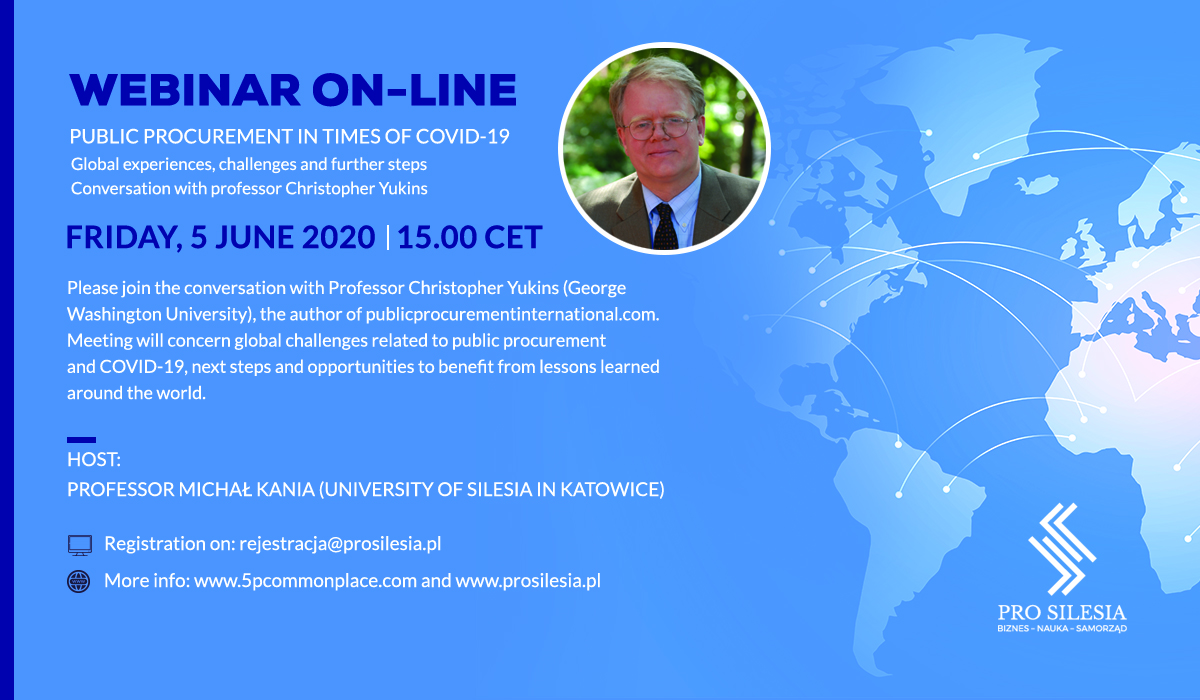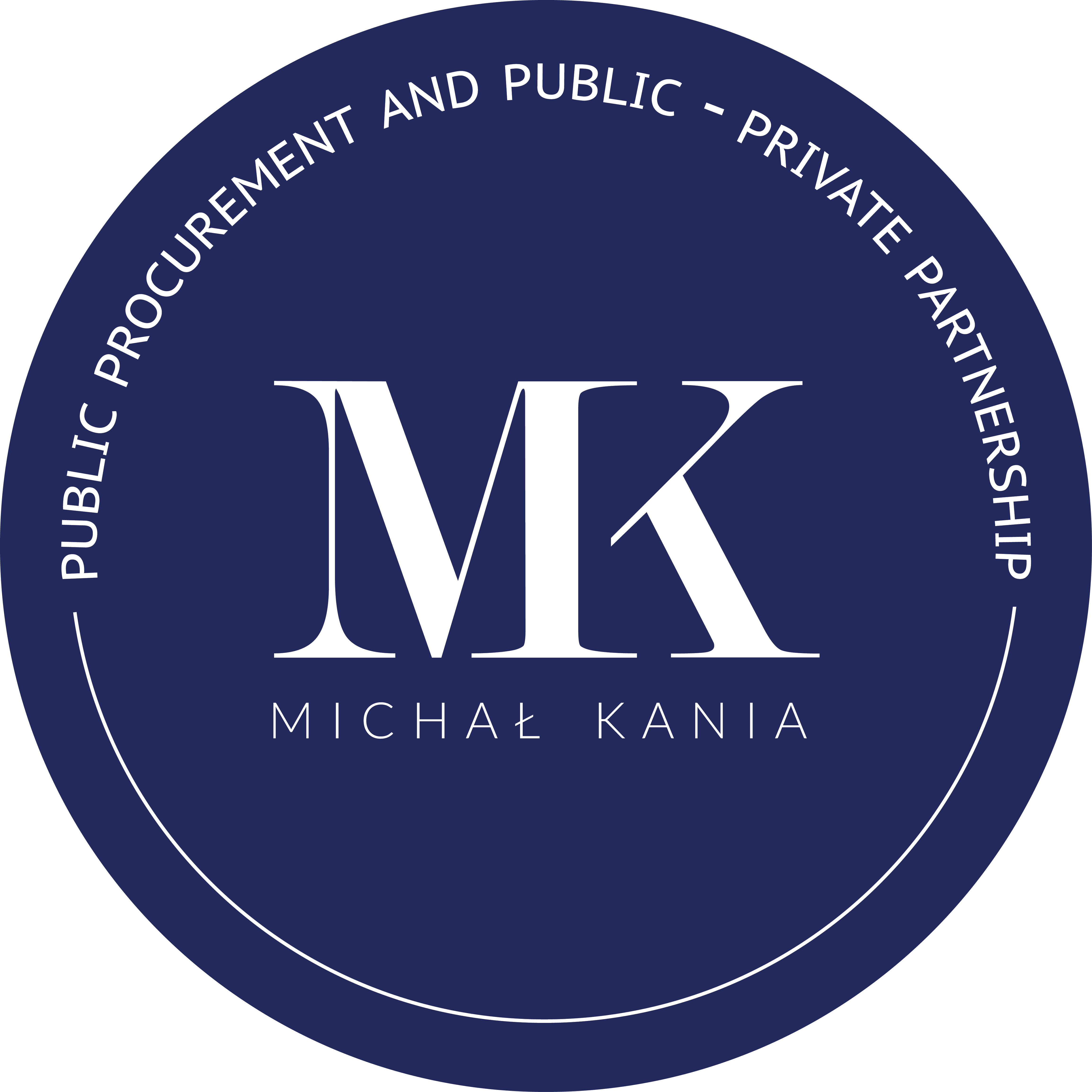White Paper dealing with the distortive effects caused by foreign subsidies in the Single Market

On June 17 the European Commission has adopted a White Paper dealing with the distortive effects caused by foreign subsidies in the Single Market. The Commission now seeks views and input from all stakeholders on the options set out in the White Paper. The public consultation, which will be open until 23 September 2020, will help the Commission to prepare for appropriate legislative proposals in this area.
Foreign subsidies in EU public procurement procedures has been presented in the Module 3 of the White Paper. Foreign subsidies may enable bidders to gain an unfair advantage, for example by submitting bids below market price or even below cost, allowing them to obtain public procurement contracts that they would otherwise not have obtained. Under this Module, the White Paper proposes a mechanism where bidders would have to notify the contracting authority of financial contributions received from non-EU countries. The competent contracting and supervisory authorities would then assess whether there is a foreign subsidy and whether it made the procurement procedure unfair. In this case, the bidder would be excluded from the procurement procedure.
A package of solutions introduced by the Act on Interest Rate Subsidies on Bank Loans Granted to Provide Financial Liquidity to Businesses Affected by Covid -19 (known as Anti-Crisis Shield 4.0.) of 19 June 2020 related to the Polish Public Procurement

The Act on Interest Rate Subsidies on Bank Loans Granted to Provide Financial Liquidity to Businesses Affected by Covid -19 (known as Anti-Crisis Shield 4.0.) of 19 June 2020, is quite significant for the public procurement market. The solutions contained in this normative act are to support businesses suffering economic consequences resulting from the pandemic. The range of solutions it introduces includes also those applicable in the public procurement sector.
The most important of these include the issue of amending the content of a public procurement contract when it is found that the proper performance of the contract is affected by circumstances surrounding the occurrence of Covid-19. Until the solutions provided for in Anti-Crisis Shield 4.0. entered into force, a claim on the part of a contractor to amend the content of the contract in situations referred to in Article 15r section 1 of the act did not exist. Pursuant to Article 15r section 4, after stating that circumstances related to the occurrence of Covid-19 may affect or influence the proper performance of the contract, the contracting authority was entitled to amend the content of the contract. Such a solution gave the contracting authority a discretionary right to amend the content of the contract, even if the circumstances related to the Covid-19 pandemic were clearly found to have affected the proper performance of the contract. Therefore, the regulation did not guarantee any protection to contractors.
Anti-Crisis Shield 1.0. introduced a provision of Article 15r section 4 that had to be treated only in terms of clarifying the content of Article 144 section 1 point 3 of the Public Procurement Law, which could rightly be assessed as insufficient from the point of view of the contractors. The solution introduced in Anti-Crisis Shield 4.0 brings a significant change in this respect. After stating that the circumstances related to Covid-19 affect the proper performance of a contract, the obligation to modify the contract as referred to in Article 15r section 4 of the act is imposed on the contracting parties de lege lata. At the same time, pursuant to Article 15r section 4a, if it is found that the circumstances related to Covid-19, as referred to in section 1, may affect the proper performance of the contract, also referred to in section 1, then the contracting authority, as before, may agree with the contractor to amend the content of the contract between them, but does not have to.

Significant changes have also been introduced in relation to advance payments, the payment of remuneration in parts and the return of security submitted by contractors. Ratio legis of solutions provided for in Article 15vb of Anti-Crisis Shield 4.0. is to support the financial liquidity of businesses operating on the public procurement market, and it should be considered quite advantageous. The introduced solutions will, in fact, contribute to increasing the attractiveness of the public procurement market for businesses. Article 15vb section 2 imposes an obligation on contracting authorities to pay remuneration in parts, after the performance of a part of a public procurement contract, or to make an advance payment for the performance of the contract, in the case of contracts entered into for a period longer than 12 months. At the same time, the contracting authority specifies in the contract the percentage of the remuneration paid for the execution of its individual parts, with the percentage value of the last part of the remuneration not exceeding 50% of the remuneration due to the contractor. Advance payments may not be less than 5% of the amount of remuneration due to the contractor (Article 15vb section 3). In the case referred to in Article 143a section 1 point 1 of the Public Procurement Law, namely for construction works contracts whose term of performance exceeds 12 months, the contracting authority may indicate in the terms of reference to the contract the percentage of the last part of the remuneration, which may not be more than 50% of the amount of remuneration due to the contractor.
The solutions introduced by Anti-Crisis Shield 4.0. also provide for reducing the value of the performance bond to 5% of the total price quoted in the tender, or the maximum nominal value of the contracting authority’s obligation under the contract (Article 15vb. section 5). The security may be set at a higher amount – up to 10% of the total price stated in the tender or the maximum nominal value of the contracting authority's obligation under the contract – if justified by the subject matter of the contract or the existing risk related to its performance, as described by the contracting authority in the terms of reference (Article 15vb section 6). In addition, pursuant to Article 15vb section 7, the contracting authority may return the performance bond in part, after the execution of a part of the contract, if it has provided for such a possibility in the terms of reference to the contract. An important solution was also added under Article 15r (1) section 1.
It sets out that, during the period of declared state of epidemiological threat or state of epidemic in connection with Covid-19, and for 90 days from the date of cancellation of the state that was last in force, the contracting authority may not enforce a contractual penalty reserved for the non-performance or improper performance of the contract referred to in Article 15r section 1 from the contractor's remuneration, or other receivables of the contractor, and may not seek satisfaction from the performance bond for this contract, if the occurrence in connection with which this penalty was reserved took place during the period of declared state of epidemiological threat or state of epidemic. At the same time, during the period of a state of epidemiological threat or state of epidemic declared in connection with Covid 19, and for 90 days from the date of cancellation of state that was last in force, the statute of limitations for the contracting authority's claim referred to above does not commence, and is suspended if it has already commenced. This period may expire no earlier than 120 days after the last state is cancelled (Article 15r (1) section 2). It should be noted that, if the term of the performance bond expires during the declared state of epidemiological threat or state of epidemic, the contracting authority cannot claim satisfaction from the bond if, at least 14 days before the bond expires, the contractor extends its validity or provides a new performance bond, and the contracting authority accepts the bond terms (Article 15r (1) section 3). If the term of the performance bond expires between 91 and 119 days after the declared state of epidemiological threat or state of epidemic in relation to Covid-19, the term of the bond is automatically extended by law to 120 days after the cancellation of this state (Article 15r (1) section 4).

Another solution provided for in Anti-Crisis Shield 4.0. concerns the legislator’s removal of the obligation imposed on contracting authorities to demand that contractors pay a bid bond in the case of contracts with a value exceeding the EU thresholds. Lege iuris, pursuant to Article 45 section 1 of the Public Procurement Law, the contracting authority should demand that contractors pay a bid bond if the value of the contract is equal to or exceeds the amounts specified in the regulations issued pursuant to Article 11 section 8. In light of the new Article 15va of Anti-Crisis Shield 4.0., contracting authorities may require contractors to pay a bid bond in such situations, but do not have to.
Shield 4.0. also introduces changes in terms of announcing contracts in relation to open tender procedures. Under the amended Article 40 section 1 of the Public Procurement Law, it will be sufficient to initiate proceedings under an open tender procedure by publishing a contract announcement on the website.
Another important change is that it is no longer necessary to apply the provisions of the new Public Procurement Law to Employee Capital Plans (ECP) management contracts and contracts for maintaining ECPs with a contract value below the EU thresholds. The relevant regulation was included in Article 7 section 2a of the Act on Employee Capital Plans of 4 October 2018, according to which "the provisions of the Public Procurement Law of 11 September 2019 (Journal of Laws, item 2019 and of 2020, item 288) do not apply to ECP (Employee Capital Plans) management contracts and contracts for maintaining ECP, if the value of the contract is lower than the EU thresholds referred to in Article 3 section 1 of that act.
Crew Dragon spacecraft docked with the ISS

Crew Dragon spacecraft docked with the International Space Station on May, 31. The spacecraft with two American astronauts: Bob Behnken and Doug Hurley docked with the ISS at 10.16 a.m. Eastern. The successful mission has been completed through the PPP agreement between NASA and SpaceX. It was the first pairing in space featuring a crewed spacecraft constructed by a private entity and the first step to the next moon landing within NASA Artemis program.
With the Artemis program, NASA plans to land the first woman and next man on the Moon by 2024, using innovative technologies to explore more of the lunar surface than ever before.
Webinar: Public procurement in times of Covid-19. Global experiences, challenges and further steps. Conversation with professor Christopher Yukins.

Please join the conversation with Professor Christopher Yukins (George Washington University), the author of publicprocurementinternational blog. Meeting will concern global challenges related to public procurement and COVID-19, next steps and opportunities to benefit from lessons learned around the world.
Registration on: rejestracja@prosilesia.pl

Professor Christopher Yukins serves as co-director of the government procurement law program at George Washington University Law School, and has taught there on contract formations and performance issues in public procurement, bid protests and claims litigation, state and local procurement, anti-corruption issues, foreign contracting, procurement reform, and comparative and international law. He has testified on issues of procurement reform and trade before committees of the U.S. Congress and the European Parliament. He is a visiting professor at the Université Paris Nanterre, where he lectures annually, and has taught a week-long course on procurement issues and corruption at the International Anti-Corruption Academy (Austria).
He has spoken as a guest lecturer at institutions around the world, and he was a contributing editor to the UN Office on Drugs and Crime manual, Guidebook on Anti-Corruption in Public Procurement. He is an active member of the Public Contract Law Section of the American Bar Association, and is a member of the Procurement Roundtable, an organization of senior members of the U.S. procurement community. He is a faculty advisor to the Public Contract Law Journal, is a member of the editorial board of the European Procurement & Public-Private Partnership Law Review, and is on the advisory board of The Government Contractor. He has worked on a wide array of international projects on capacity-building in procurement, and he was an advisor to the U.S. delegation to the working group on reform of the United Nations Commission on International Trade Law (UNCITRAL) Model Procurement Law. Together with his colleagues, he runs a colloquium series on procurement reform at The George Washington University Law School.
In private practice, Professor Yukins has been an associate, partner and counsel at leading law firms; he is currently counsel to the firm of Arnold & Porter.
Public Procurement and COVID-19 in Poland. ''COVID-19 Act'' with subsequent amendments.

The text below in PDF and the text of public procurement provisions in COVID-19 Act are available in Teaching Materials section.
Polish regulations concerning COVID-19 and public procurement encompass main three groups of legal provisions:
- first the special regulation stipulated in Article 6 of the Act on special arrangements for preventing, counteracting and combating COVID-19 (the “COVID-19 Act”), other infectious diseases and the crisis situations they cause of 2 March 2020,
- second the regulation introduced by the Act of 31 March 2020 on amending COVID-19 Act. There are two legal solutions related to public procurement in this regulation. First is dedicated to contractual changes and has been foreseen in articles 15r., 15s. and 15t. Second concerns exclusion of implementation of the Public Procurement Law for contracts awarded by Bank Gospodarstwa Krajowego www.en.bgk.pl, Polski Fundusz Rozwoju Spółka Akcyjna https://pfr.pl/en/ or the regional developments funds under special circumstances and has been regulated in article 6 section 2 of the amended COVID-19 Act.
- third group of legal provisions is based on the regulation in the Public Procurement Law of 29 January 2004 (Journal of Laws of 2019 item 1843).
Article 6 section 1 of Act of 2 March 2020 on special arrangements for preventing, counteracting and combating COVID-19, other infectious diseases and the crisis situations they cause of – Covid-19 Act
1. The COVID-19 Act came into force on 8 March.
http://prawo.sejm.gov.pl/isap.nsf/download.xsp/WDU20200000374/O/D20200374.pdf
In accordance with Article 6 section 1, contracts for goods or services necessary for counteracting COVID-19 are not subject to the provisions of the Public Procurement Law of 29 January 2004, if there is high probability of the rapid and uncontrolled spread of the disease, or if it is required in order to protect public health.
2. The Polish legislator decided to exclude the implementation of the entire Polish Public Procurement Law, which can be done under specific circumstances. The interpretation of the provision of Article 6 has been developed by the Polish Public Procurement Office. https://www.uzp.gov.pl/aktualnosci/Komunikat-w-sprawie-art.-6-tzw.-ustawy-o-COVID-19
3. First, it should be noted that the exclusion of the Public Procurement Law concerns only goods or services and can only take place if the contracts are necessary for counteracting COVID-19. These two circumstances are mandatory in every situation when a contracting authority decides to exclude the Public Procurement Law. In addition, the law can only be excluded if one of two additional legal circumstances applies: a) there is a high probability of the rapid and uncontrolled spread of the disease, and b) the purchase of goods and services is required in order to protect public health.
4. Before any decision to exclude the Public Procurement Law, the contracting authority must analyse the circumstances and justify the decision in view of the aim of the COVID-19 Act, as set out in its Article 2 section 2, which gives the aim as being: preventing, counteracting and combating the spread of COVID-19.
Act of 31 March 2020 on amending Act of 2 March 2020 on special arrangements for preventing, counteracting and combating COVID-19, other infectious diseases and the crisis situations they cause of
5. The Act on Amending the COVID-19 Act was adopted on 31 March and comes into force on 1 April. This regulation sets out the entire proposal prepared by the Polish government to act against the effects of the COVID-19 epidemic on the Polish economy, including crucial for public procurement regulation related to contract changes. Also the exclusion of implementation of the Public Procurement Law for contracts awarded by Bank Gospodarstwa Krajowego or Polski Fundusz Rozwoju Spółka Akcyjna under special circumstances has been stipulated in this act.
In accordance with article 6 section 2 of amended COVID-19 Act the provisions of the Public Procurement Law will not apply to contracts awarded by Bank Gospodarstwa Krajowego or Polski Fundusz Rozwoju Spółka Akcyjna or the regional development funds, referred to in Article 13 Section 1a of the Act on Local Government at Voivodeship Level of 5 June 1998 (Journal of Laws 2019, items 512, 1571 and 1951), relating to the implementation of: 1) tasks concerning the service of funds established, entrusted or transferred on the basis of separate provisions and related to the implementation of government programmes, or other programmes implemented from public funds, or 2) tasks related to the use of funds from such funds - concerning support instruments necessary to counteract the negative economic effects of the COVID-19 outbreak.
6. The main group of the provisions related to public procurement included in the Act of 31 March 2020 on Amending the COVID-19 Act concerns the contract changes. The Polish legislator decided to draft a specific provision concerning the modification of public procurement contracts, previously set out in Article 72 section 1c of Directive 2014/24/EU of the European Parliament and of the Council of 26 February 2014 on public procurement and repealing Directive 2004/18/EC, which says that ”Contracts and framework agreements may be modified without a new procurement procedure in accordance with this Directive in any of the following cases, where all of the following conditions are fulfilled: (i) the need for the modification has been brought about by circumstances that a diligent contracting authority could not have foreseen; (ii) the modification does not alter the overall nature of the contract; (iii) any increase in price is not more than 50% of the value of the original contract or framework agreement. Where several successive modifications are made, that limitation will apply to the value of each modification. Such consecutive modifications will not be aimed at circumventing this Directive’’.
7. Article 72 section 1c of Directive 2014/24/EU was implemented into Polish law through Article 144 section 1 item 3 of the Public Procurement Law. Due to this provision: ,,Any amendments to the provisions of a concluded contract or framework agreement, when compared to the content of the tender based on which the economic operator has been selected, shall be prohibited, unless at least one of the following circumstances occur: the following conditions are jointly met: a) necessity to amend the contract or the framework agreement results from the circumstances which could not be predicted by the contracting authority despite acting with due diligence. b) value of the amendment does not exceed 50% of the contract value defined originally in the contract or in the framework agreement’’
8. The provisions concerning modifications to a public procurement contract have been regulated in Article 15r. of amended COVID-19 Act. The aim of this provision is to mitigate the results of the COVID-19 epidemic on the performance of public procurement agreements in Poland.
9. Under Article 15r. section 1 of the amended COVID-19 Act, the parties to a public procurement contract must notify each other immediately about the effect of circumstances connected with COVID-19 on the proper performance of the contract, if any such effect has occurred or may occur.
10. The parties to the public procurement contract will confirm this effect by including declarations or documents that may refer to this occurrence with the notification mentioned in particular:
1) the number and positions of employees or paid contractors not in an employment relationship who participate or could participate in the performance of the contract, and who:
a) are subject to obligatory hospital treatment due to counteracting COVID-19,
b) are subject to obligatory quarantine or epidemic supervision, due to coming into contact with individuals whose health was at risk due to COVID-19,
c) are released from performing work because they must personally take care of a child, as set out in Article 32 paragraph 1 item 1 of the Act on Cash Benefits from Social Insurance in the case of Sickness and Maternity of 25 June 1999, or a child certified as having a major or mild disability to the age of 18, or a child with a disability certificate if a nursery, children’s club, nursery school, school or other organisation attended by the child is closed, or if it is not possible to arrange for supervision or daytime care for the child due to spread of the COVID-19 disease;
2) decisions issued by the Chief Sanitary Inspector, or a national sanitary inspector in a certain province, acting under the authority of the Chief Sanitary Inspector, obliging the contractor to perform certain preventive or control activities in connection with counteracting COVID-19;
3) orders issued by provincial governors or decisions issued by the Prime Minister in connection with counteracting COVID-19, as described in Article 11 sections 1 and 2;
4) suspending deliveries of goods, components of goods or materials, problems with access to equipment or problems in executing transport services;
5) the circumstances described in items 1-4, to the extent applicable to a sub-contractor or further sub-contractor.
11. Article 15r. section 2 stipulates that each party to such a contract may demand to be presented with additional declarations or documents confirming the effect of circumstances connected with COVID-19 on the due performance of the contract. Due to article 15r. section 3 within seven days of receiving the declarations and documents, a party to a contract described its position to the other party, along with the justification regarding the effect of the circumstances connected with COVID-19 on the due performance of the contract. If a party to the contract receives subsequent declarations or documents, the time limit is counted from the date of receiving them.
12. Due to article 15r. section 4 upon finding that circumstances connected with COVID-19 affects or may affect the due performance of the contract, the contracting authority may, in agreement with the contractor, amend the contract, as referred to in Article 144 section 1 item 3 of the Public Procurement Law of 29 January 2004, which implemented Article 72 section 1c of the Directive 2014/24/EU, in particular by:
1) changing the time limit for performing the contract, or its part, or temporarily suspending the performance of the contract, or its part,
2) changing the method of performing deliveries, services or construction works,
3) changing the scope of the contractor’s performance and changing the contractor’s remuneration corresponding to the change in the scope of performance
– as long as the increase in price caused by each subsequent change does not exceed 50% of the initial value of the contract.
13. In accordance with article 15r. section 5 if such a contract contains provisions that make the situation of the contractor more favourable than it would be under regulation mentioned above, these provisions will apply after the change to the contract.
14. Article 15r. section 6 concerns contractual penalties or liability for damages. It is of the great importance to the contractors that, if such a contract contains provisions regarding contractual penalties or liability for damages due to the non-performance or improper performance in connection with indicated circumstances, a party to that contract, may present the impact of the circumstances connected with COVID-19 on its proper performance, and the impact of the change to the contract on the legitimacy of establishing and enforcing those penalties or damages, or their amounts.
15. In the Article 15r. sections 7, 8 and 9 Polish legislator decided to establish support of subcontractors and further subcontractors. Due to article 15r. section 7 upon finding that circumstances connected with COVID-19 affects or may affect the due performance of a contract to perform a public procurement order, contractor and a subcontractor will agree on an appropriate amendment to the agreement between them. In particular, they may change the time limit for performing the contract, or its part, or temporarily suspend the performance of the contract, or its part, change the method of performing the contract, or change the scope of mutual benefits.
16. According to article 15r. section 8 where an amendment is made to a contract referred to in section 1, and that amendment covers part of the contract entrusted to a subcontractor, the contractor and the subcontractor will agree on an appropriate amendment to the agreement between them, in order to ensure that the conditions for performing that agreement by the subcontractor are no less favourable than those for performing the contract referred to in section 1, as amended in accordance with section 4. Article 15.r section 9 stipulates that the provisions of sections 7 and 8 apply accordingly to an agreement between the subcontractor and a further subcontractor.
17. Article 15s. and Article 15t. provide for the exclusion of the legal liability of contracting authorities due to abandoning claims related to the public procurement contracts. In accordance with article 15s. the following do not constitute a breach of public finance discipline, as referred to in Article 5 section 1 points 1 and 2 and Article 17 section 6 of the Act on Liability for a Breach of Public Finance Discipline of 17 December 2004 (Journal of Laws of 2019, items 1440, 1495, 2020 and 2473, and of 2020, item 284): 1) a failure to determine or not to seek from a party to a contract referred to in Article 15r. section 1, receivables arising in connection with the non-performance or improper performance of a public procurement contract as a result of circumstances related to the occurrence of COVID-19, as referred to in Article 15r. section 1; or 2) an amendment of the public procurement contract in accordance with Article 15r. section 4.
18. Article 15t. stipulates that the offence referred to in Article 296 § 1-4 of the Criminal Code of 6 June 1997 is not committed by anyone who fails to establish or claim from a party to a contract agreement referred to in Article 15r section 1 the amounts due resulting from the non-performance or improper performance of a public procurement contract as a result of circumstances related to the occurrence of COVID-19, as referred to in Article 15r. section 1, or who amends a public procurement contract in accordance with Article 15r. section 4.
19. The regulation adopted in Articles 15r., 15s. and 15t. of the COVID-19 Act 2020 may be implemented also in PPP projects that are based on the availability payment method. The justification of this approach is based on Article 4 paragraph 1 of the Act on Public-Private Partnerships of 19 December 2008. In accordance with this legal norm ,,the provisions of the Act of 29 January 2004 - Public Procurement Law (JoL of 2017, items 1579 and 2018, of 2018, items 1560, 1603, 1669 and 1693) shall apply to the selection procedure of the private partner and the agreement on public-private partnership in any matters not regulated herein’’.https://www.ppp.gov.pl/file.php?i=przegladarka-plikow/Ustawa-o-PPP-EN-opublikowana-17-12-2018.pdf
Regulation foreseen in the Public Procurement Law of 29 January 2004 (Journal of Laws of 2019 item 1843)
20. Aside from the regulation provided in the COVID-19 Act, the provisions of the Public Procurement law and other related acts shall be implemented.
https://www.uzp.gov.pl/data/assets/pdf_file/0019/40177/Public_Procurement_Law_2018_consolidated.pdf
21. In particular, the negotiation procedure without publication (Articles 61–65) and single source procurement (Articles 66-68) may be used in specific situations arising in connection with the current problems and limitations.
Public Procurement and Public Private-Partnership

Public Procurement and Public Private-Partnership (PPP) are methods, which can support public sector in achieving common golas, such as: sustainability and innovation of public infrastructure. Public procurement and PPP shall respond to the current global challenges such as combat of pandemia, implementation of 4th Industrial Revolution benefits, 5G, building Smart Cities, responding to geostrategic challenges and improving of eco-innovation. The role of academics, both private and public sector is to support the public procurement and PPP in common public mission.

Michał Kania, professor at the University of Silesia in Poland, Senior Researcher at the Centre for Private Governance (University of Copenhagen), legal adviser with 16 years of practical experience in PPP, public procurement and concession contracts, member of the Just Transition Research Group at the University of Silesia. Active member of the Public Procurement Association in Poland, Visiting Fulbright Scholar at the George Washington University (2018-2019), Fellowship of German Academic Exchange Service at the Ludwig Maximilian University in Munich (2017), author of more than 100 publications regarding PPP, public procurement law, administration law and administration procedure, speaker at the Polish and international conferences, initiator and lecturer at the Postgraduate Studies in Public-Private Partnership and Public Procurement at the University of Silesia, founder and the first president of the PPP Academic Support Foundation, founder of the program ‘’PPP- Good Choice’’ (active in years 2009 – 2014), former president of the PPP Commission by the Conference of Rectors of Academic Schools in Poland, independent adviser for the Polish Ministry of Development for the concept of the new Polish Public Procurement Act, adopted on 11 September 2019, plenipotentiary of the President of the University of Silesia for PPP projects, MBA, with the final thesis: ,,Economic and financial analyses in public – private partnership projects’’.